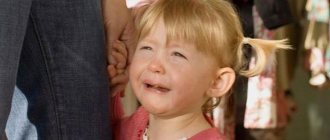Parents' first actions after the incident
After parents find out that their child has bitten a peer in kindergarten, the first thing to do is:
- Do not give in to emotions, behave calmly.
- Ask the teacher if there is a bad role model in the group. Maybe another child bites children, and your child decides to repeat his behavior.
- Ask the working staff to observe the child to find out when and under what circumstances such situations occur.
- If the incident occurred for the first time, you need to analyze what changes have occurred in the baby’s life recently.
- Do not allow the baby to feel depressed, oppressed and different from everyone else because of an unpleasant incident.
Weaning off biting using different techniques in special cases
Sometimes it happens that a child over 3 years old bites due to weakness of the masticatory muscles. To determine whether this is true or not, you need to show the child to a pediatrician and dentist.
If the diagnosis is confirmed, you can use the following techniques to strengthen the necessary muscles:
- inflate balloons;
- play the musical pipe;
- blow soap bubbles, etc.
There are many methods to stop biting. By trying different methods, you can achieve a stable result, but do not forget that the main component of the harmonious and full development of the baby is the love and attention of the parents.
Why does the child bite?
There may be several reasons for this unpleasant phenomenon, all of which will be described in detail below. But they have the same source – emotionality. According to statistics, about ten percent of children are born more temperamental than the other ninety. These kids react very violently to any events, both positive and negative. The feelings of such children are hypertrophied. Everything is either too good for them, or, conversely, very bad. When experiencing some strong emotion, a child bites children in kindergarten. He does this not because he wants to hurt another student in the group, but because he is unable to contain his emotions and feelings and express them in another way. He can bite not only when he is upset or offended, but also when he is overwhelmed with joy and the baby wants to share it.
If a child began to use his teeth after he started attending kindergarten, then the culprit may simply be a contagious example. Even a child who is not prone to aggression can fall under the influence of the majority and begin to take actions so as not to stand out. Confident children who are praised by their parents, most often in such a situation will not succumb to the influence of the team.
Below we describe in detail the main reasons for the appearance of this bad habit in a child, and ways to solve the problems that arise in connection with this are given.
Causes of children's "biting"
If we are talking about children under the age of 3, then, according to the psychologist, he may bite others due to a banal inability to express his emotions, love, or his teeth are simply growing. The behavior of a child who bites at the age of 3 years cannot be called normal. What should be done in this case? The first action is to find the reason for this behavior. The second is to solve the problem, relying on the advice of a psychologist, since “biting” children is often a psychological problem.
By carefully observing a child who has begun to bite at home or in kindergarten, it is quite easy to determine the reason for his aggressive behavior.
| Cause | Description | What to do? |
| Bad example | Children often imitate not only adults, but also peers. Therefore, if one of the children in kindergarten bites their peers, your baby may well adopt this manner of defense or aggression. | Do not scold your child under any circumstances. It is necessary to explain in a friendly manner that biting is not allowed, that in this way the baby hurts his friends. And imitating bad actions means becoming a bully, not a decent person. |
| Defensive reaction | A child may begin to bite if he is often offended in kindergarten - toys are taken away, pushed, or not taken to play. Since children aged 3 years are still unable to understand the current situation due to lack of life experience and insufficient development of the psycho-emotional sphere, they respond to insults with a bite. | Explain that you cannot respond to insults by biting. Teach how to communicate with children and share toys. If situations arise when a child is offended, teach them to ask adults for help, and resolve the conflict not with teeth, but with speech. |
| Lack of attention | A child may bite in kindergarten if parents pay little attention to him and spend little time with him. By biting other children, he attracts the attention of adults and peers, and at these moments he absolutely does not care whose it is or what it is: positive or negative. The main thing is that he was noticed. In addition, due to his age characteristics, the child does not understand well that by his actions he is hurting someone. | Spend more time with your child: play, read books, walk outside, draw, sculpt, talk, in the end! Hug your baby, talk about your love, talk about how much and how long you have been waiting for him, kiss, praise, support. |
| Proof of your own worth | Finding himself in kindergarten, where everything is alien and there are no relatives nearby who will protect and pity, the child begins to bite in order to gain authority among his peers. The desire to become a leader can be so strong that the child simply cannot control it. Therefore, he tries to “subdue” his peers using a rather aggressive method. | Explain through role-playing games that it is very offensive to be bitten, and it is unlikely that in this way he will achieve favor with his peers. |
| Sense of anxiety | A child may bite other children (and even adults) because he is uncomfortable in the conditions where he is at the moment, or he is scared, he feels defenseless and lonely. | You should surround the child with even more care and love, and, if possible, give him more personal space. If your little one feels anxious while adapting to kindergarten, allow him to take his favorite toy with him. |
| Troubles in the family | Frequent quarrels between parents, their divorce and conflicts disrupt the child’s mental balance. In response to family troubles, the child begins to bite his peers, in this way calling for help. | Try to improve the situation in the family. If any conflict situations occur, try to resolve them in the absence of the child. |
| Aggression from parents | And it’s not always beatings and screams. Some parents oppress their children with excessive severity, multiple prohibitions, authoritarianism, and disrespect. Therefore, children have a response - to bite others, since they cannot morally influence the offenders. | Start with yourself. Review your educational methods, be gentler, respect your child’s opinion, review the prohibitions. |
| As a means of communication | Well, which parent has never bitten the tiny heels or sides of their baby?! But this is how we show our love for children. And if you do this often, the baby can subsequently define these actions for himself as an expression of positive feelings - friendship, respect, love, affection. | Don't allow yourself to bite your child, even when playing. An innocent game can turn into a serious problem. |
| Hyperactivity | Overly active children are more likely to bite their peers than children with normal activity. Hyperactive preschoolers often do not have time to use their accumulated energy during the day, which subsequently finds release through biting. | Plan your child's day so that he has no time for pranks. Walk outside more, provide him with more outdoor games, enroll him in a sports section. However, it is better to plan activity for the first half of the day. After lunch, quiet activities should prevail - drawing, modeling, reading, designing. |
| Fatigue | Not every child can withstand prolonged noise, din, or a large crowd of people in one room. From such a fuss, calm children (or, conversely, nervous ones) quickly get tired. Psychologists say that bites in this case are a hidden request from the baby to leave him alone because he is too tired. | If you see that the child is tired, do not touch him, provide him with rest. |
Each of the reasons can be determined by careful observation of the child. If your baby is attending kindergarten at this time, ask the teaching staff to monitor your baby, in what situations he begins to bite his peers, which contributes to his condition. For your part, start paying more attention to the baby, take an interest in his life, successes, hug him more often and tell him how much he is dear to you.
Reason one. Proof of significance
Often, a child begins to bite only to prove his importance and gain authority in the team. In this way, he wants to achieve the subordination of the surrounding group students to him and the ability to control their actions. The first reason why a child bites children in kindergarten is indicated. How to proceed in this case?
The main thing is to teach the child to express his desires not with bites, but with words. It is easy to explain to a child that being bitten is offensive and painful, using games where he must participate in the situation, first as a “biter”, and then as a victim. During this entertainment, you need to show that simple phrases like “I don’t want”, “I’m angry” or “I don’t like this” are much more effective than bites.
Reason two. Sense of anxiety
A child may bite when he experiences a feeling of anxiety or discomfort from being in a particular place or environment. He is probably scared or feels defenseless. If a child bites children in the garden precisely for this reason, then to solve the problem, parents need to surround him with even more love and care, and the teacher should try to create a friendly atmosphere around the baby and, perhaps, give him a little more personal space. Kindergarten workers should help their child find a corner where he will feel safe. If the baby has only recently been to kindergarten, you need to give him time to adapt. Let him take with him to the group his favorite toy or other thing from home that will give him a feeling of confidence and calm.
Norm or deviation?
When a six-month-old baby bites, this is considered the norm, since there are objective physiological reasons that prompt the baby to do just that.
According to pediatricians, such reasons disappear by the age of 2, so after this age the child should not bite.
If this does happen, there may be several reasons:
- constant psychological pressure (ridicule in kindergarten, attacks from stronger children, etc.);
- a turbulent situation in the family in which the baby lives (perhaps the parents often fight, or he is subjected to domestic violence);
- neurological pathologies;
- excessive aggression (occurs if the child often sees cases of assault);
- lack of love and care (leads to isolation).
Psychological disorders can be successfully corrected up to the age of 4-6 years. After 6 years of age, therapy becomes several times more difficult, and the results will not be as good as in young children.
Reason three. Unspent Energy
Sometimes it happens that a hyperactive child plays the role of a “biter”. And he uses his teeth only because during the day he was unable to throw out a sufficient amount of energy.
When such a child bites children in kindergarten, what should the teacher and parents do? Strictly follow the baby's daily routine. Before lunch, he is recommended to play outdoor games and exercise, for example, dancing, swimming, cycling. But it’s better to spend the second half of the day calmly, drawing, playing with construction sets, sculpting from plasticine or reading books.
Reason five. Lack of attention
If the baby seems that mom and dad are not paying enough attention to him, he looks for ways to correct this. In order to somehow hook the parents, the child bites the children in the garden.
What should adults do? You need to try to spend as much time as possible with the baby. Hugging him, kissing him, playing together, reading books and just chatting. Soon an invisible connection will be established between parents and the child, his psychology will become more clear, and it will be possible to predict when and for what reason the baby may bite. It is at this moment that you need to shift his attention to something that distracts the child from the desire to use his teeth.
Reasons why a child bites
It has been proven that most often children show aggression precisely at the age when they are about to go to kindergarten.
Often, mom and dad learn from the teacher that their baby is behaving in such a negative way.
- First of all, you need to look for the cause at home. Mom and dad must understand how prosperous the situation in the family is. If quarrels and hostility constantly reign in it, then it is not surprising that the child also copies the mood of adults, manifesting it in such a strange way.
- Constant punishment is an additional motivation that leads to aggression on the part of the baby. Even if the family is characterized in a positive way, this cannot be a special indicator.
- Pain, feeling unwell.
- Hyperactivity is the case if, from a young age, adults allow absolutely everything and indulge. For them, a baby’s bites are just a reason to laugh and smile.
- Adopted someone's behavior in a peer group - this often happens when children look at each other and copy behavior. In this case, unfortunately, not only positive, but also negative aspects are copied.
Often parents punish their child for the slightest offense. It has been proven that a child up to a certain age simply does not realize his actions. If he turned over the TV, this does not mean that he did this on purpose.
Rather, he climbed onto the nightstand or shook it, trying to take something. But if adults do not understand this behavior, they begin to scold and express obvious dissatisfaction. Such an attitude cannot provoke positive emotions.
If you do not stop such activities, you can end up with an adult child who does not understand why he is now being scolded, but just recently they laughed and smiled from the same actions.
What to do after a child bites, and what not to do
It is strictly forbidden to respond to the “biter” with aggression. You shouldn’t scream or try to spank him, especially if you don’t try to use your teeth for the purpose of education. Retaliatory aggression will not lead to a solution to the problem, but can only intimidate the child and give rise to complexes in him. The main thing an adult must do is to calmly and confidently explain to the child how he hurt his peer.
It is necessary to make it clear to the child that it is better to replace bites with the words “no”, “I don’t like”, “I don’t want”, “I’m angry”. That the use of speech is more effective than the use of teeth. Playing out such situations using dolls has a positive effect on the baby.
It happens that a child bites children to test others. He is curious what the reaction will be, what is the limit of what is permitted, and what he can get away with. In this case, adults should make it clear that this cannot be done. Parents need to explain: when you bite, you cause pain. It's much better to hug and kiss.
If the child repents
It happens that a child bites children in kindergarten not on purpose, but in a fit of emotion or due to fatigue. After this, he himself is frightened of his action and sincerely repents.
In this case, there is no need to reprimand him. On the contrary, you should invite the child to ask for forgiveness from a peer, blow on the bite site, stick a band-aid, and give him a toy. But such behavior of adults is expected only in the case when for a child this situation is really isolated and is not the norm of behavior.
How to stop a baby from biting?
The principles for ridding a child of a bad habit are as follows:
- Never give a positive reaction (laughter or smile) if someone has been bitten.
- Do not use your teeth towards your baby, even in a playful way. For him, there is no difference between the gentle biting of an adult and his own similar (as it seems to him) actions.
- Teach your baby alternative ways of getting what he wants - using gestures and words, not teeth.
- Explain to the child that they need to treat their peers. For example, you should share cookies with them. When your baby offers treats to other children, you need to praise him.
- Teach your child to play with a toy not by himself, but in turns with other children. Be sure to praise if this happens before your eyes.
- Show your baby how to express his positive emotions towards toys while playing. For example, how to hug a bear, stroke a kitten or kiss a doll. Praise the child if he plays calmly and peacefully.
- In the case when a child throws toys, you need to explain that the doll is unpleasant and you should feel sorry for it.
- Organize and encourage games with sand, water or clay, as such activities pacify aggression.
- Give your child the opportunity to draw, especially with paints.
- If a child bites children in kindergarten, then at home you should treat him with solid food as often as possible. Let him gnaw on carrots, cabbage, cucumbers, apples, crackers or bagels.
- The baby needs to periodically play with blocks or construction sets.
- The baby should have a specially designated place where he can crawl, lie around and tumble.
- A child should not see adults swearing and fighting among themselves.
- It is necessary to strictly follow the baby’s daily routine.
How can a child express anger?
Anger is a natural emotion that has the same right to exist as others. Sometimes even adults who know how to control themselves experience this feeling. The difference between a baby and a mom or dad is that the parents know how to express anger without causing harm to others, but their offspring does not have this skill. Why does a child bite children? Because he's angry. We need to teach him to get rid of this emotion with the help of inanimate objects. For example, you can beat a sofa cushion, tear unnecessary pieces of paper into small pieces, throw soft balls at the wall, mold plasticine and flatten his feelings of anger with your fist, scream and growl loudly.
You cannot completely try to suppress the baby’s negative emotions, because this can later lead to visits to a child psychologist and neurologist.
Which child is more likely to become a biter?
Child psychologists and pediatricians, including Dr. Komarovsky, believe that a tendency to bite, pinch and pugnacity is characteristic of children with certain character traits or arises as a result of illness or family problems and errors in education.
They bite most often:
- Copycat kids. That is, those who like to copy the manners of others. They can bite, following the example of domestic kittens or puppies or imitating the actions of classmates.
- Overly emotional little ones. Some babies are very active emotionally from birth. The imperfection of the nervous system in the first years of life does not allow them to adequately cope with their feelings, so they express them through pinching and biting.
- Children who do not receive enough attention from adults. In this case, the baby may well bite not only loved ones, but also himself on the arm or leg.
- Children with a tendency to aggression. If a child continues to bite even when it is possible due to age to control his desires, that is, after three years, then this in most cases indicates an increased level of aggression. To get rid of a bad habit and prevent the emergence of other problems in older age, you need to start seeing a psychotherapist as early as possible and follow his recommendations.
- Children who have congenital weakness of the masticatory muscles. This usually manifests itself as a strong addiction to the pacifier, and after weaning off it, it is the appearance of the habit of biting.
The reason for the craving for aggression, splashed out on others, in young children is often an unhealthy family environment.
Constant quarrels, tension, screaming negatively affect the fragile psyche of the little ones, causing them fear, misunderstanding, resentment, and sometimes unconscious hatred.
Children cannot influence the situation in any way, and they express their feelings through aggressive actions aimed at parents, themselves or other children.
Often, preschool children begin to unknowingly gnaw or bite their lips. This habit occurs when negative emotions predominate, with a lack of microelements or vitamins, or due to the formation of crusts.
To cope with a problem, you need to determine the main cause of its occurrence and, starting from it, look for solutions.
Prevention of bad habit
Why does a child bite children? Because his parents don't praise him. A timely word of approval will prevent the desire to bite. You need to praise your baby when his behavior corresponds to your requests, for example, if he treats his peers, shares toys, takes into account the wishes of others, and shows patience.
By hugging your child at the right moment, you can help him associate his non-aggressive behavior with pleasant sensations. Soon the baby will understand that it is better to receive a positive reaction to his peaceful behavior than a negative reaction to his bitten peers.
In turn, parents and kindergarten workers should show the child by example how to deal with anger and irritation.
A good method of prevention is role-playing games with a child. Here are some topics for such psychological trainings:
- A child's toy is taken away.
- The kid got angry.
- The baby was hit or called names.
- The child is scared.
The purpose of such classes is to teach the child to express emotions exclusively in words, without using teeth.
The teacher said that your child bites children. What to do about this problem? We need to help the baby. First of all, you should try to figure out the reason why your baby developed this bad habit. Next, the main task of parents is to eliminate this factor influencing the behavior of the baby. Adults must be patient and use their wisdom in solving this problem. The main helpers in this will be attention, hugs and kisses. A self-confident child, who is often praised in a meaningful way, will not resolve issues by biting other children. And remember that you cannot be spoiled by love. Thanks to this article, you will definitely be able to turn the evil “biter” into the best “kisser”.
And yet it happened...
If a bite does occur, place your palm on the aggressor’s mouth (a method of psychological influence) and sternly, but not irritably, explain that you cannot bite anyone. The child’s speech successes relieve him of “biting.” Having learned to express protest with words, the baby begins to lose the tendency to bite his comrades.
How to stop a child from biting in kindergarten? — In difficult cases of ineradicable aggression, the teacher is obliged to recommend you consultation with a psychologist. A psychologist is not a typical doctor. He finds out the reasons for inappropriate behavior and helps solve the behavior problem. Treatment by a psychologist looks like a set of good advice, and not a terrible diagnosis and a medicinal blow to the nerves of a naughty child.
A good method for preventing biting is role-playing games. The teacher can and should play with them with the child. The purpose of such classes is to disinhibit the baby’s speech centers, teach him to express emotions with words, not teeth. Parents are obliged to support the teacher. Act out scenes in which the child must refuse you. Here are some topics for home psychological training:
- They take your toy.
- You got angry.
- They hit you and called you names.
- You're scared.











